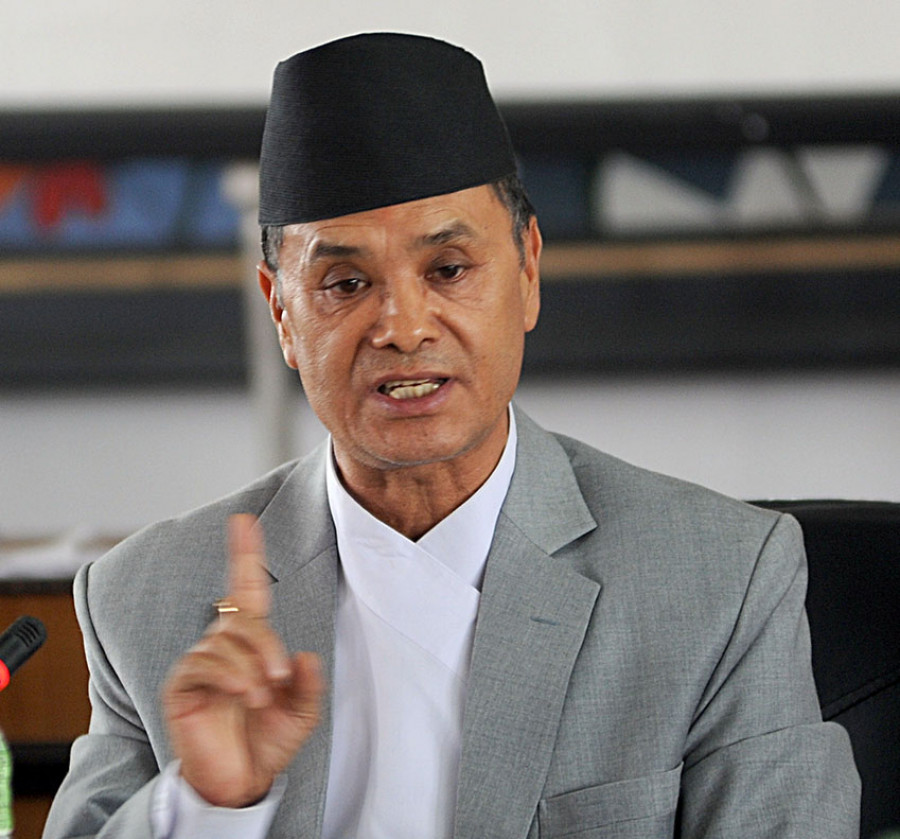National
Rana not to sit on Constitutional Bench to hear case of controversial appointments
Questions were raised whether Rana should preside over the bench to hear the cases where he has conflict of interest.
Tika R Pradhan
Chief Justice Cholendra Shumsher Rana has agreed not to sit on the Constitutional Bench that hears petitions against the appointments in various constitutional bodies made through an ordinance to amend the Constitutional Council Act.
The decision comes amid controversy surrounding the petitions that involve the Constitutional Council of which Rana is a member. Questions were raised whether Rana should preside over the bench to hear on the cases where he has conflict of interest.
“The chief justice has decided not to present himself in the first and the last hearings of the petitions against appointments made through an ordinance to amend the Constitutional Council Act, as he was also involved in the decisions as a member of the Constitutional Council,” said Baburam Dahal, spokesperson for the Supreme Court. “Senior-most Justice Deepak Kumar Karki will lead the Constitutional Bench in his absence.”
Though Rana decided not to be part of the bench that hears the petitions, some experts say that questions may arise over the spirit of the constitution which clearly states that the bench consists of the chief justice and four judges designated by him on the recommendation of the Judicial Council.
Others, however, argue that Rana’s decision to clear the way to settle the longstanding issue was technical and won’t affect the constitutional provision.
Article 137(1) of the constitution says the Constitutional Bench exists in the Supreme Court and that it shall consist of the chief justice and four other judges designated by the chief justice on the recommendation of the Judicial Council.
“I think Chief Justice Rana took the right decision,” said Baburam Giri, a senior advocate. “I don’t think it will affect the constitutional provision.”
As soon as the Constitutional Bench picked the candidates to be appointed to the constitutional bodies on December 15, petitions were filed by Senior Advocate Dinesh Tripathi and Advocate Om Prakash Aryal demanding that the appointments based on the ordinance be scrapped.
Later, on February 5, Speaker Agni Prasad Sapkota filed another petition demanding that the appointments be revoked.
Sapkota has made Chief Justice Rana one of the defendants for being a member of the Constitutional Council that decided on the appointments without the presence of some of its other members including the Speaker.
Six months after the Speaker’s petition, Chief Justice Rana, on August 8, issued a response defending the appointments as having been made following the due legal process.
On Friday, a five-member Constitutional Bench formed under Rana to hear the case of appointments made by the Constitutional Council met with a protest from the petitioners.
The plaintiff side objected to the presence of the chief justice in the bench claiming that it flouted the principle of natural justice. The principle says no one should be the judge of their own case. It is one of the fundamental rules of natural justice that no one should act as a judge in a case in which they have a personal interest.
Senior advocate Tripathi, one of the petitioners, told the bench that Chief Justice Rana had direct conflict of interest in the petitions and therefore he must refrain from remaining in the bench.
There were concerns over the formation of the Constitutional Bench as the constitution clearly states that the chief justice will form the bench but legal experts had suggested him to allow the second in command to form the bench.
Chief Justice Rana did not readily agree to stay away from the case though.
He told petitioners that he would agree to what the remaining four members of the bench decide.
But when the petitioners remained skeptical, saying what if the opinion was divided equally among the four, Rana finally acquiesced.
The ordinance to amend the Constitutional Council (Function, Duties, Power and Procedure) Act-2010, brought by the KP Sharma Oli government on December 15, repealed by the Sher Bahadur Deuba government on July 18.
A day after the Deuba government repealed the ordinance on the Constitutional Council Act, advocate Om Prakash Aryal on July 19 filed a supplementary petition at the Supreme Court demanding a “quo warranto''.
Aryal said his demand for “quo warranto” means those 52 individuals appointed under the now-repealed ordinance must show on what warrant they are holding their offices.
Experts have said that the absence of chief justice, as envisioned by the constitution, does not mean that s/he won’t fall ill or go for a foreign visit during which another senior-most justice must take the charge.
“Chief Justice Rana’s move to refrain from that particular bench was a technical issue and that won’t affect the spirit of the constitution,” said Anup Raj Sharma, the former chief justice. “While drafting the constitution I had said there could be some hurdles with the provision if the member of the Constitutional Council also heads the Constitutional Bench. And the issues are gradually emerging now.”




 19.12°C Kathmandu
19.12°C Kathmandu














